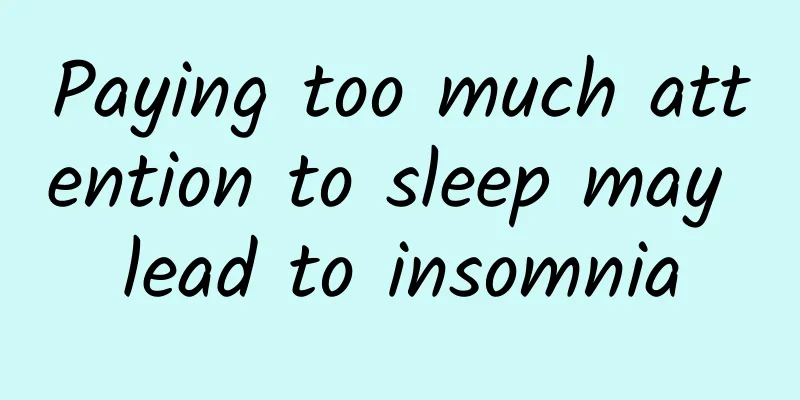Paying too much attention to sleep may lead to insomnia

|
This is the 4939th article of Da Yi Xiao Hu Retired Aunt Li has suffered from insomnia for nearly half a year. Every day, she thinks about how to "sleep well". She searched for sleep-aiding methods on Baidu, bought sleep-aiding tools, and even took two different sleeping pills on the recommendation of a neighbor, but the effect is still minimal. So what is going on? After retirement, Aunt Li usually takes care of her grandchildren, buys groceries, and takes a nap after lunch to make up for the sleep debt she owed in the past. She lives a seemingly comfortable life, but Aunt Li says she is miserable and always has trouble sleeping at night. In order to sleep every night, she has made a lot of preparations, such as eating so-called "sleep-aiding" foods before going to bed, "health exercises before going to bed", and going to bed early to cultivate her senses. WeChat public accounts always push information about "insomnia" increasing the risk of various diseases, such as hypertension, diabetes, cancer, dementia, etc., which makes Aunt Zhang, who was originally anxious and nervous, even more worried and afraid. She feels that she is not getting enough sleep all day, and her quality of life has been greatly reduced. For half a year, Aunt Li always felt that her brain was almost always awake at night, and even when she fell asleep, she was only confused for a few minutes. She tried every means to catch up on sleep from the moment she left the bed. This feeling made her very uncomfortable, and she would worry about it during the day. However, her mental state did not look as bad as other people who had poor sleep. After a period of observation, her family found that her sleep at night seemed to be lighter than that of normal people, and sometimes she even snored slightly, but she still insisted that "I basically didn't fall asleep, and I could hear you talking in the living room clearly." So what is considered insomnia? Insomnia refers to a subjective experience in which one is dissatisfied with the sleep time and/or quality despite having a suitable sleep opportunity and sleep environment, and this affects daytime function. For example: ① Difficulty falling asleep (unable to fall asleep within 30 minutes after going to bed); ② Sleep maintenance disorder (awakening ≥ 2 times throughout the night); ③ Decreased sleep quality (feeling not refreshed after waking up); ④ Reduced total sleep time (usually <6.5 hours); ⑤ Early awakening (30 minutes earlier than the expected waking time); ⑥ Accompanied by daytime functional disorders (such as fatigue, depression, irritability, memory loss, etc.). Aunt Li always feels that she didn’t sleep well. Is she really suffering from insomnia? There may be subjective insomnia! Subjective insomnia is relative to objective insomnia, also known as false insomnia, which means that patients often feel that they have severe insomnia, which may even last for months or years, and they cannot sleep all night. However, objectively, patients do not have sleep disorders, good sleep quality, and no symptoms of difficulty falling asleep. Because patients firmly believe in it, it is difficult to persuade them to believe it. Polysomnography can be used to confirm that there is no abnormality in sleep time and sleep structure, helping them to eliminate anxiety about sleep. Therefore, this subjective insomnia is often caused by the patient's lack of common sense about "sleep" and excessive focus on sleep. If you always feel that you sleep lightly and never fall asleep, but your family tells you that you sleep well, then what is your real sleep performance? Did you really have a sleepless night? Sometimes we need to trust our intuition, but sometimes we can't trust ourselves too much. For example, sleep may give us illusions. You may go to the hospital for a polysomnography to determine whether it is true or not. Author : Yueyang Hospital of Integrated Traditional Chinese and Western Medicine affiliated to Shanghai University of Traditional Chinese Medicine Shi YangDeputy Chief Physician Clinic hours : Saturday afternoon (Room 10, 3rd floor, South Building, No. 44 Qinghai Road) |
>>: Don't treat migraine as a disease
Recommend
Dangers of high blood sugar in early pregnancy
High blood sugar in early pregnancy is an abnorma...
World Encephalitis Day丨Unveiling the secrets of lumbar puncture to help you open the "mysterious door" of the brain
February 22 is World Encephalitis Day. On this da...
Is bird's nest good for ovarian follicles?
As a woman's organs gradually mature, an egg ...
Why does pubic hair turn white?
The vulva generally refers to the female reproduc...
Can pregnant women use eye drops?
Eye drops are a common type of eye solution in ou...
How to best nourish kidney deficiency? Top 10 ways to nourish the kidney recommended by traditional Chinese medicine practitioners
Kidney deficiency refers to the deficiency of kid...
Can I get pregnant if I have Hepatitis B virus (HBV)?
Hepatitis B virus (HBV) is highly infectious and ...
8 months pregnant belly hard and tight
When a woman is eight months pregnant, she must p...
How to care for diarrhea after abortion
Abortion is actually a relatively common gynecolo...
What are the symptoms of malnutrition during pregnancy?
When a normal person is malnourished, they will h...
How long does it take to discharge after 12 weeks of medical abortion?
Although there are many women who are looking for...
What should I do if the painless abortion is not done cleanly?
Most women who choose not to have the fetus in th...
What kind of tiles are good for house decoration? Which kind of tiles are better for house decoration?
We all know that decorating a house is a complica...
Is it serious if my period is delayed for 15 days?
Female friends usually encounter the problem of d...
Vulvar pimples without pain or itching
Bumps appear on the vulva, but they are not painf...









